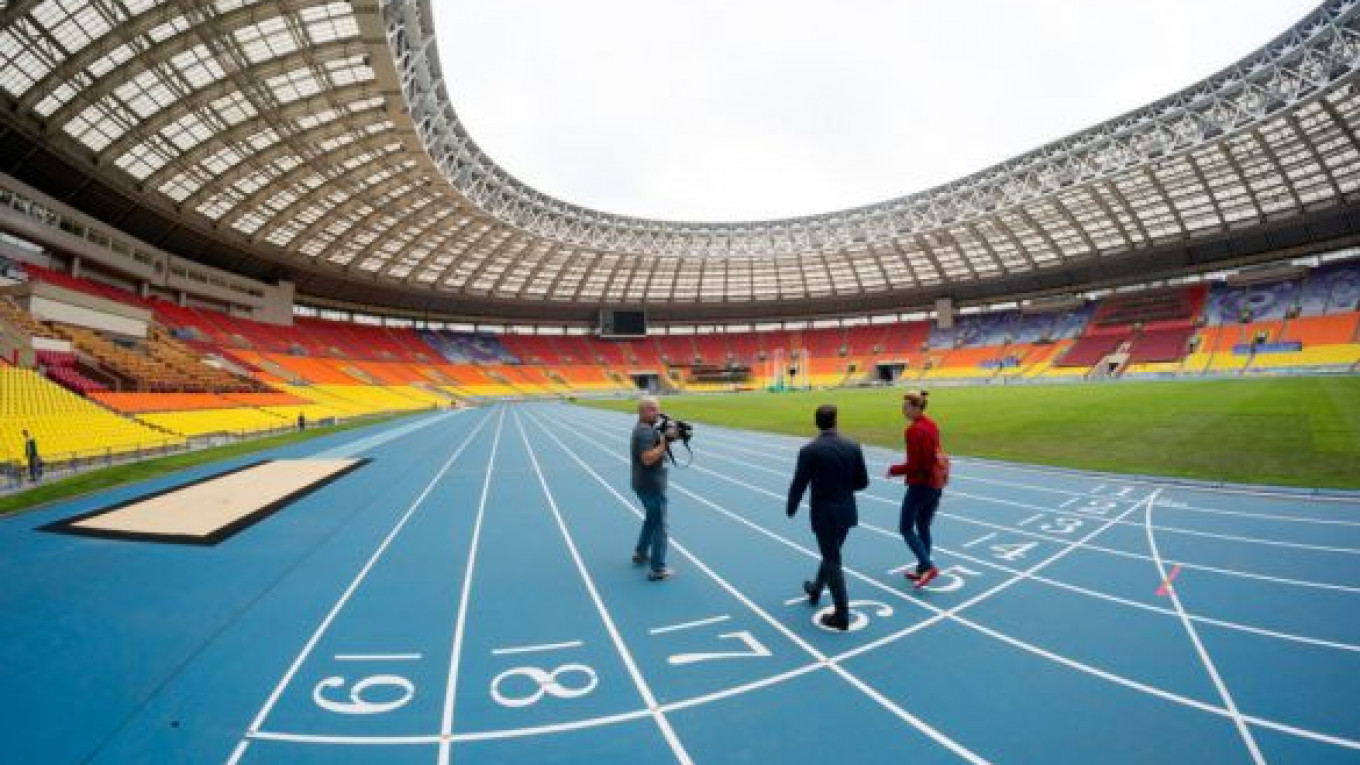The roar that rocked Luzhniki Stadium as national favorite Yelena Isinbayeva won gold in the pole vault at the world athletics championships on Tuesday marked a long-awaited moment for the people gathered in the stands.
For Russian sports veterans, it was also a reminder of the stadium's former Olympic glory and of the fact that the legendary venue, much like Isinbayeva, is about to take an extended break from sports. The athletics championships is the last event that Luzhniki is hosting before closing for reconstruction in preparation for the 2018 World Cup.
The stadium, which opened in 1956 after just 450 days of construction, has been the site of numerous seminal cultural and sporting events in Russia's history. It hosted the opening and closing ceremonies of the 1980 Summer Olympics as well as concerts by the Rolling Stones, Bon Jovi and Madonna that brought the West closer to the former Soviet republic. Luzhniki was also the setting for the last concert of Viktor Tsoi before the 28-year-old Russian rock legend died in a car crash later that summer.
"When I saw the full stands at Luzhniki and how people cheered for our athletes, for Lena Isinbayeva, I remembered the Olympic Games in Moscow and how the huge stadium had cheered for you," Alexander Zhukov, president of the Russian Olympic Committee, said to a group of 1980 Olympics champions this week.
Luzhniki Stadium will be reconstructed to meet FIFA's requirements for World Cup hosts. Officials were initially asked to demolish the arena completely in favor of a venue that could accommodate 89,000 people in the stands, but in the end they were able to knock that number down to 81,000 seats, which will make it possible to keep the frame of the stadium intact.
"Moscow would have lost a piece of its identity and an Olympic symbol," acting Moscow Mayor Sergei Sobyanin told Rossiiskaya Gazeta this week.
Municipal authorities previously said they planned to spend 10 to 28 billion rubles ($303 million to $850 million) to reconstruct Luzhniki. The project was pitched to several investors, but they all rejected it after deeming the plan unprofitable, so authorities said they would complete it using budget funds. Deputy Mayor Marat Khusnullin said on Aug. 6 that the reconstruction costs would be 20 billion rubles, Interfax reported.
Specific design plans for the reconstruction will be released in the next four to five months, but the latest statements from authorities suggest that the core of the work will focus on the inside of the stadium, while the facade will remain as Muscovites remember it.
Ground work on the reconstruction will begin this year, with actual building slated to kick off in spring of next year. By the time the stadium hosts the World Cup's opening match, it will have more seats and a deeper-set field, according to Khusnullin.
As the construction work gets set to begin, veterans of the 1980 Olympics remain unconvinced that Luzhniki's Olympic spirit will survive the ambitious plans.
"When someone starts talking about reconstruction, my heart starts bleeding," said Galina Gorokhova, three-time Olympic gold medallist in fencing and president of the Russian Athletes Union. "There is always all this talk — this will be demolished, that will be demolished. We keep demolishing everything, and what we end up building is a nightmare."
Gorokhova said she is also concerned that the stadium facilities, already expensive for city residents, will become even less accessible after the reconstruction. She lives close to the sports complex but cannot use any of its services because of the high prices.
In Gorokhova's view, the reconstructed stadium should have as many sports clubs as during the Soviet period, so that people can easily take part in physical activity throughout the day and the area becomes a magnet for visitors similar to Gorky Park.
"The prices have to be different," Gorokhova said. "What nonsense is it that you have to pay 300 rubles to swim at an inconvenient time. Only pensioners can come in during those times, and they can't pay 300 rubles. So the pool stands unused, but they still don't lower prices."
Local residents also expressed concern that the stadium would lose its iconic look and that the construction plans, which include a number of new buildings including a hotel and a shopping mall, could even cause some area residents to be displaced. City Hall has dismissed those worries as groundless.
Zhukov, for one, is more optimistic about the potential to preserve Luzhniki's historical value.
"The demands for hosting the opening and final matches of the World Cup, and football matches in general, are somewhat different from what we see now at Luzhniki, so there will be reconstruction to fulfill FIFA requirements," Zhukov told The Moscow Times. "But I hope [Luzhniki] will still maintain its character as a historic stadium."
Visit our photo gallery of the World Championships in Athletics that wrapped up on Sunday.
Contact the author at [email protected]
A Message from The Moscow Times:
Dear readers,
We are facing unprecedented challenges. Russia's Prosecutor General's Office has designated The Moscow Times as an "undesirable" organization, criminalizing our work and putting our staff at risk of prosecution. This follows our earlier unjust labeling as a "foreign agent."
These actions are direct attempts to silence independent journalism in Russia. The authorities claim our work "discredits the decisions of the Russian leadership." We see things differently: we strive to provide accurate, unbiased reporting on Russia.
We, the journalists of The Moscow Times, refuse to be silenced. But to continue our work, we need your help.
Your support, no matter how small, makes a world of difference. If you can, please support us monthly starting from just $2. It's quick to set up, and every contribution makes a significant impact.
By supporting The Moscow Times, you're defending open, independent journalism in the face of repression. Thank you for standing with us.
Remind me later.






